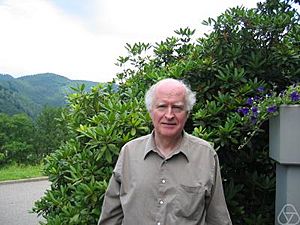John N. Mather facts for kids
Quick facts for kids
John N. Mather
|
|
|---|---|

Mather at Oberwolfach in 2005
|
|
| Born |
John Norman Mather
June 9, 1942 Los Angeles, California, U.S.
|
| Died | January 28, 2017 (aged 74) Princeton, New Jersey, U.S.
|
| Nationality | American |
| Alma mater | Harvard University Princeton University |
| Known for | Smooth functions Topologically stratified space Aubry–Mather theory Mather theory |
| Awards | John J. Carty Award for the Advancement of Science (1978) National Order of Scientific Merit (Brazil) (2000) George David Birkhoff Prize (2003) Brouwer Medal (2014) |
| Scientific career | |
| Fields | Mathematics |
| Institutions | Institut des Hautes Études Scientifiques Harvard University Princeton University |
| Doctoral advisor | John Milnor |
| Doctoral students | Giovanni Forni |
John Norman Mather (born June 9, 1942 – died January 28, 2017) was a very important mathematician. He worked at Princeton University in the United States. Mather was famous for his studies on how shapes and movements change. This area of math is called singularity theory and Hamiltonian dynamics.
Contents
Early Discoveries in Math
John Mather's early work looked at how "smooth mappings" behave. Imagine you have a shape, and you change it a little bit. Mather studied when these changes would still keep the shape looking "stable" or similar to how it was before. He figured out the exact conditions for this to happen.
He also proved a big idea from a French mathematician named René Thom. This idea was about how most smooth changes are "stable" in a general way. Mather's notes on this topic are still used by students and scientists today.
Exploring Dynamical Systems
In the 1970s, Mather started studying dynamical systems. This is a field of math that looks at how systems change over time. Think about how planets move, or how a pendulum swings. Mather made several important discoveries in this area.
Understanding System Behavior
One of Mather's contributions was introducing the idea of the "Mather spectrum." This helped scientists understand how certain complex systems behave. He also described a special type of system called "Anosov diffeomorphisms."
The Four-Body Problem
Working with another scientist, Richard McGehee, Mather looked at a famous problem. This was the "collinear four-body problem." It's about how four objects, like planets, move in a straight line. They showed that these objects could crash or fly apart very quickly. This discovery helped make a long-standing idea, the Painlevé conjecture, seem more likely.
Finding Stable Paths
Mather developed a special theory known as Aubry–Mather theory. This theory helps find the "best" or "most efficient" paths in certain kinds of moving systems. It's like finding the most stable way for something to move or change. This idea was based on earlier work by other mathematicians.
Later, he expanded this theory to more complex situations. This new, broader theory is now called Mather theory. It turned out to be connected to other important math ideas, like how "viscosity solutions" work for certain equations.
Arnold Diffusion and Group Theory
Mather also worked on a complex problem called "Arnold diffusion." This problem is about how energy can spread out in certain systems over a long time. He made important progress towards solving it.
In another series of studies, Mather showed that certain groups of "diffeomorphisms" (which are like smooth transformations) have special properties. He proved that these groups are "perfect," meaning they are equal to their own "commutator subgroup." This is a very advanced concept in group theory.
Awards and Recognition
John Mather was a highly respected mathematician. He was a member of the National Academy of Sciences starting in 1988. He received several important awards for his work:
- The John J. Carty Award in 1978.
- The Brazilian Order of Scientific Merit in 2000.
- The George David Birkhoff Prize in 2003.
- The Brouwer Medal from the Royal Dutch Mathematical Society in 2014.
He also helped edit the "Annals of Mathematics Studies" series, which publishes important math books.
See also
- List of members of the National Academy of Sciences
 | William M. Jackson |
 | Juan E. Gilbert |
 | Neil deGrasse Tyson |

